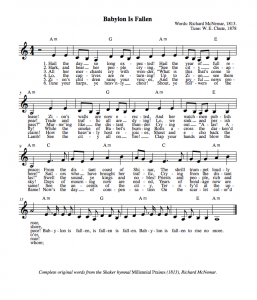Back in the early nineteenth century, Richard McNemar wrote a hymn commonly called “Babylon is Fallen,” which was included in the 1813 Shaker hymnal Millennial Praises. It is a hymn with typical Biblical apocalyptic imagery, probably based on Revelation 18.21 ff. Today the hymn is most commonly associated with an 1878 tune by W. E. Chute, and the Roud Folksong index number is S227926.
But the words most commonly sung today, e.g. in folk music circles and by Sacred Harp singers, are not the original words; four of the original six verses get ignored, and a third verse (probably added when Chute wrote his tune) is tacked on. I like the original words better, and when I read the first three verses, it feels as though the hymnodist were describing the current financial meltdown in the U.S.:
1. Hail the day so long expected!
Hail the year of full release!
Zion’s walls are now erected,
And her watchmen publish peace:
From the distant coasts of Shinar,
The shrill trumpet loudly roars,
Refrain
Babylon is fallen, is fallen, is fallen,
Babylon is fallen to rise no more.2. Hark, and hear her people crying,
“See the city disappear!
Trade and traffic all are dying!
Lo, we sink and perish here!”
Sailors who have bought her traffic,
Crying from her distant shore,
Refrain3. All her merchants cry with wonder,
“What is this that’s come to pass?”
Murm’ring like the distant thunder
Crying out, “Alas! Alas!”
Swell the sound, ye kings and nobles!
Priests and people, rich and poor!
Refrain
Now obviously neither Richard McNemar nor the author of Revelation is describing today’s financial meltdown. But in our culture, we are so accustomed to thinking in apocalyptic terms that we tend to link current events with apocalyptic images. Mind you, there are some parallels between the book of Revelation and the United States today: Revelation was a highly metaphorical critique of the inhumanity and injustice of the Roman Empire, and insofar as the U.S. is an empire which has in some important ways modeled itself after the Roman Empire (e.g., why do you think the Senate is called the Senate?), I could argue that it is subject to many of the same anti-imperial critiques.
The last three verses do not seem as if they correspond to current events as well as the first three verses. I suppose you could argue that the “smoke of Babel’s burning” in the fourth verse is somehow associated with the riots in London; but weren’t we talking about the U.S., not the U.K.? And who are these captives that are returning? — maybe Central American immigrants coming across the border? If so, the hymn is written from their point of view. In the fifth verse, the ancients of the city are terrified, but the politicians in Washington don’t seem at all terrified to me. And the sixth verse gets into problematic territory with the imagery of the whore:
4. Lo, the captives are returning!
Up to Zion see them fly!
While the smoke of Babel’s burning
Rolls across the darken’d sky!
Days of mourning now are ended,
Years of bondage now are o’er,
Refrain5. Zion’s children raise your voices,
And the joyful news proclaim!
How the heavenly host rejoices!
Shout and echo back the same!
See the ancients of the city,
Terrify’d at the uproar!
Refrain6. Tune your harps, ye heavenly choir!
Shout, ye foll’wers of the Lamb!
See the city all on fire!
Clap your hands and blow the flame!
Now’s the day of compensation
On the scarlet colour’d whore;
Refrain
But I have caught myself singing the first three verses to myself in the past month or so. In some poetic, non-linear way, this hymn helps me deal with the ongoing catastrophe that is the Great Recession. If you want to sing along, I’ll include a complete lead sheet:


Thank you so much for this sheet music. I’m hoping it will prove useful as some of the souls in my care have asked me specifically to talk about Revelation 18.
Although this appeared to be a genuine comment, I had to delete it because the commenter did not use a legitimate email address — a known tactic of malicious hackers testing commenting defenses by trying to comment on old posts. If you’re a real commenter, please comment again using a working email; I will follow up with you via email to determine if you’re legit, then approve your comment. It’s unfortunate I have to be this way, but I’ve learned through bitter experience.